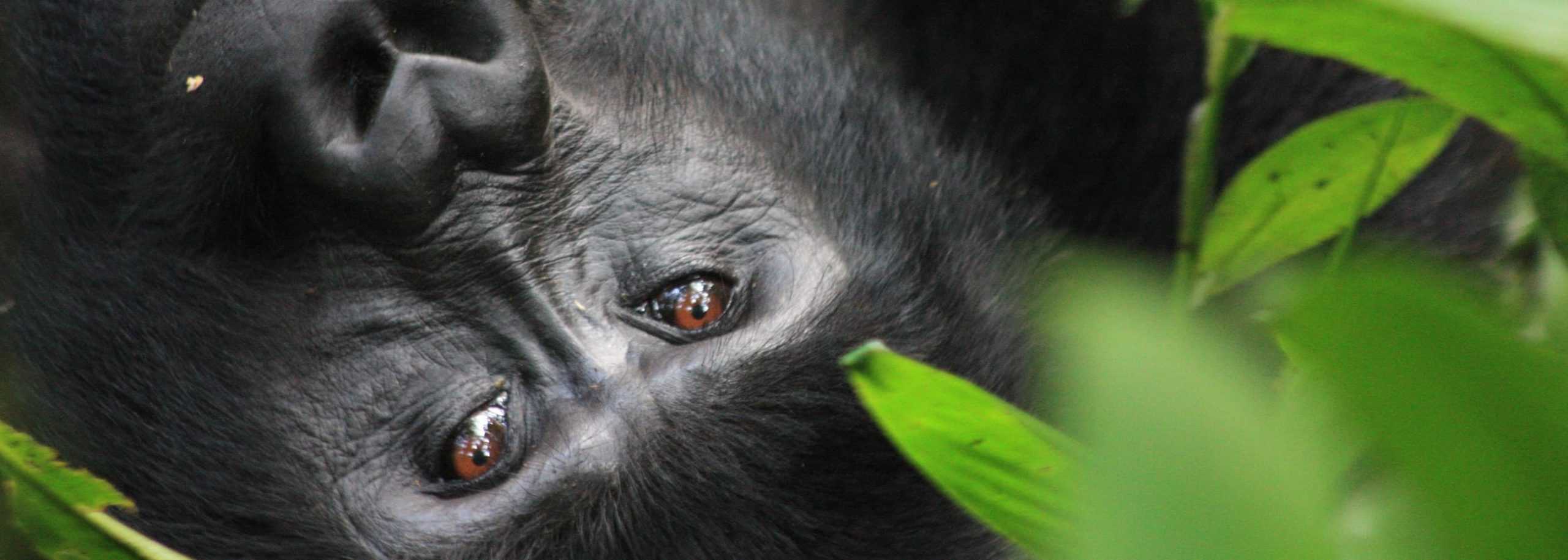Cross-boarder Investigation: Mountain gorilla rescued from poachers
Advocacy | 9/08/11
An investigation is currently underway to identify how and why a young mountain gorilla* (see the update below posted in April 2012) ended up in the hands of poachers attempting to smuggle the gorilla into Rwanda from the Democratic Republic of Congo the evening of Sunday, August 7th.
The mountain gorilla (originally reported to be male, but now is confirmed as female), estimated to approximately 15-months-old (originally reported to be less than one year old), was found alive and is now in the care of veterinarians and caregivers at a facility in Kinigi, Rwanda, near Volcanoes National Park. “When we walked into the jail, one of the poachers almost immediately sneezed right on the baby, who was asleep in a tight, tense ball on the bed,” Dr. Jan Ramer of the Mountain Gorilla Veterinary Project said. “He will go through a 30 day quarantine period, and hopefully will return to DR Congo at Virunga National Park’s Senkwekwe Center where he can join orphan gorillas Maisha, Kaboko, Ndeze and Ndakasi. We are cautiously optimistic for this little guy – he is tense, but accepting of people, and is eating. All good signs for his eventual recovery.”
The smugglers, a group of Rwandan and Congolese men, are in custody in Rwanda and an intense investigation into a possible larger network involved is underway. The International Gorilla Conservation Programme (IGCP), a coalition of the African Wildlife Foundation, Fauna & Flora International, and World Wide Fund for Nature, has been supporting the ongoing investigation and response measures on both sides of the border- IGCP’s Benjamin Mugabukomeye alongside Volcanoes National Park, Rwanda, and IGCP’s Altor Musema alongside Virunga National Park, Democratic Republic of Congo.
In releasing the news, the Director for Virunga National Park, Dr Emmanuel de Merode stated, “that the infant mountain gorilla was recovered and the suspected poachers arrested is a remarkable achievement by the Rwandan Authorities. Nevertheless, the incident is unacceptable and deeply worrying for us, and reflects the enormous pressures faced by our rangers, eleven of whom have been killed this year protecting the park. Efforts are underway to strengthen the protection measures through de-snaring, increased anti-poaching, and tight collaboration with the local community.”
Last night, Monday, August 8th, park authorities from both Volcanoes National Park and Virunga National Park met and have determined law enforcement response measures that will be taken immediately in the area where the mountain gorilla is believed to have been taken, as well as within the larger region. IGCP will support these measures.
“The good news is that this infant was rescued before it was too late and is now in good hands. The bad news is that people believe there is a market for baby mountain gorillas and are willing to break laws and jeopardize the fate of a critically-endangered species at the chance for profit,” stated IGCP Director Eugène Rutagarama. “We are supporting this investigation in the hopes that justice will be done and that poaching of this nature is no longer seen as potentially profitable.”
Other information circulating at the moment is speculation and won’t be released until the ongoing investigation is complete. It is still unknown which family group this mountain gorilla was taken from and whether any other mountain gorillas were injured or killed in the act of poaching the infant. Any additional updates will be amended to this post at www.igcp.org/cross-boarder-investigation-mountain-gorilla-rescued-from-poachers.
UPDATE APRIL 2012: A genetic test has confirmed this infant later named Ihirwe is NOT a mountain gorilla as originally suspected but an eastern lowland Grauer’s gorilla. More can be found here: http://gorillacd.org/2012/04/11/baby-gorilla-ihirwe/
—-
Photo: Mountain Gorilla Veterinary Project. More photos have been posted by MGVP on Facebook.
There are an estimated 780 critically-endangered mountain gorillas living within the Virunga Massif and Bwindi regions of the Democratic Republic of Congo, Rwanda, and Uganda.

